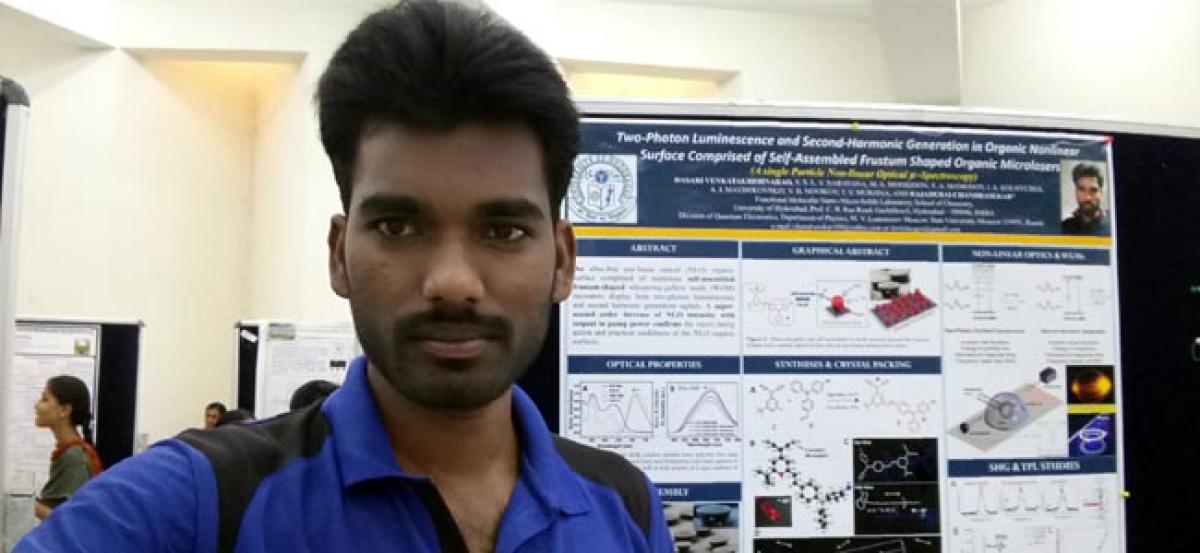Live
- Pokémon TCG Pocket to Introduce Card Trading in January 2025
- Nani unveils ‘MM 2’ title & first look
- Will challenge bail granted to actor Darshan in fan murder case in SC: Bengaluru Police Commissioner
- Chandrahass Launches Maruti Suzuki Dzire Through PJ Productions in Tolichowki Showroom
- Police case against farmers for tilling land claimed by Waqf Board in Karnataka
- Commendable move: Sandeep Dikshit on renaming Sarai Kale Khan ISBT chowk after Birsa Munda
- MahaYuti will come back to power with a thumping majority despite Oppn's tirade: Eknath Shinde
- ‘Hanging up my racquet. Thank you’ - India’s Prajnesh Gunneswaran retires from professional tennis
- Pawan Kalyan to Campaign for NDA Alliance in Maharashtra
- Eight killed, five injured in Nepal's traffic accident
Just In

Out of 400 finally selected people from all over the world Krishna from Hyderabad is the only to be selected from Telangana to attend this meeting
Out of 400 finally selected people from all over the world Krishna from Hyderabad is the only to be selected from Telangana to attend this meeting
Dasari Venkata Krishna Rao, a final year PhD student from the School of Chemistry, University of Hyderabad (UoH) has been selected for the Lindau Nobel Laureates meeting, which will be conducted in Lindau, Germany this year. This meeting happens once every year; about 30 to 40 Nobel Laureates convene at Lindau to meet the next generation of leading scientists that include PhD students and Post- Doc researchers from all over the world.
This year, out of 400 finally selected people from all over the world Krishna from the Hyderabad is the only to be selected from Telangana to attend this meeting. Sharing his excitement Krishna says, “I am very happy that my academic and my interest got me to this stage where I get to present my ideas in such a prestigious platform. I am over delighted for being the only one selected from the state.”
Krishna has completed MSc in Chemistry from UoH and after qualifying the CSIR-JRF in first attempt, he joined for PhD program in area of organic photonic materials. So far he has achieved eight international research publications that deal with novel optically linear and non-linear organic molecules, their self-assembled photonic micro structures acting as optical waveguides, resonators, modulators, and quite recently micro lasers.
“I never thought I would make my career in the field of chemistry. I just happened to score full marks in chemistry during my Intermediate, it was then I decided I should stick up with this subject. Now my theory and the innovative plans have impressed the Nobel Laureates” adds Krishna.
Sharing further about his future plans, he says “I want to be a professor wherein I get to share my knowledge and create the best students for the future. I wish to create and develop Photonic Devices through Photon chips. Though this already exists in countries like Korea, they are not actually successful enough. So I wish to recreate the devices were it just doesn’t use electrons but also use photons.”
He wanted to become a doctor during his young age, but because of his financial conditions he had to give up on his dreams but not the tag of doctorate to his name. Coming from a family of low income, neither he nor his parents wanted him to back out from academics, “Scholarships that I have been receiving for my academic excellence have got me to this stage in education. The fellowship which I get now is helping me and also I get to support my parents from the same money.”
Sharing about his plans for the Lindau Nobel Laureates meeting which is scheduled to happen in the last week of June, he says “I already started preparing for the meeting; I have many things listed as of now about what to be discussed and with whom about my ideas and the field of work. I want to cross check with everything that I have planned for future with the most experienced people there.”
Krishna is now carrying out his research under the supervision of Prof R Chandrasekar, School of Chemistry. Recently their group published first Organic Optical Non-linear Micro Lasers in Adv. Mater. (Impact factor-18.96) and the same research work he will be presenting before the Nobel Laureates at Lindau, Germany.
“The work which I am doing now will be useful in creating Photonic Chips for future generation, replacing current electronic chips. Since the speed of photons is much faster than the electron, this will be used in Photonic Devices. If a device is prepared out of these micro structures, it will enhance the optical signal and produce the high energy light through it” shares the enthusiastic scholar.
Right now, he is writing his thesis and looking for post doctor position abroad. His dream is to create the new devices that are in-turn useful in real time applications.
Bhagyashree Kottoori

© 2024 Hyderabad Media House Limited/The Hans India. All rights reserved. Powered by hocalwire.com







